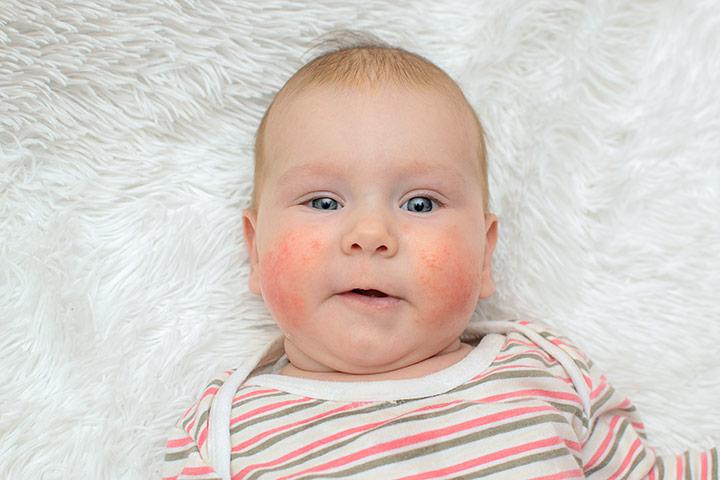As with any allergic reaction a soy allergy occurs when the body mistakes soy as a harmful invader. Dairy protein intolerances are becoming more and more common in babies and approximately 50 of babies with a dairy protein intolerance also have a soy protein intolerance.
 Dairy And Soy Protein Intolerance While Breastfeeding
Dairy And Soy Protein Intolerance While Breastfeeding
It is unclear which component of soy causes these reactions but scientists have found soy to contain at least 15 allergenic proteins.

Soy allergy baby. Allergic proctocolitis prahk-toe-koh-LIE-tis inflammation in the lower intestine caused by an allergy to cows milk or soy proteins found in formula or breast milk The symptoms of non-IgE mediated food allergies usually go away when the food allergen is removed from the infants diet. Soy allergy can also be a lifelong condition. However prevention is a better alternative any time and there are a few guidelines you can adhere to in order to keep your little one safe from certain foods.
It can happen at any age but most commonly found among babies and children who are between 3 to 10 years of age. And while there are no guarantees it will go away many children do outgrow the allergy over time. Per Kim About 50 percent of children outgrow soy allergies around seven years of age and many outgrow by 10 years old.
Diagnosing a soy allergy in an infant is really hit or miss and that is why it is very important. Whey and cassein proteins in milk can be hard for your babys stomach to break down. Allergic reactions to soy typically first appear in infants and kids under three.
If the person eats something made with soy the body thinks these proteins are harmful invaders and responds by working very hard to fight off the invader. If you are breastfeeding your baby check with your babys doctor to see if removing soy and foods that contain soy from your diet is needed. Die gleiche Bedingung gilt auch für eine Soja-Allergie.
Soja sollte nicht als erste Nahrung eines Babys verabreicht werden sondern kann auch eingeführt werden wenn es andere Lebensmittel hat. If your baby has been diagnosed with a soy allergy it is important to avoid feeding your baby any foods that contain soy. Was verursacht Soja-Allergie bei Babys.
What do I do if my baby has a soy allergy. Allergies to soy are fairly common particularly among infants. Once the baby starts to eat solid foods most of the food allergies kick in.
Wheat visit our Wheat page Children may outgrow food allergies to milk eggs soybean products and wheat. When your baby is diagnosed with an allergy towards soy there are ways to manage the reactions should they occur. See more ideas about soy allergy recipes baby food recipes.
If your child has a soy allergy consult with your allergist before reintroducing your child to soy products. Tips for Introducing Meat to Baby. Jede Allergie unter der eine Person leidet ist normalerweise die Reaktion des Immunsystems des Körpers.
The baby may produce extra gastric acids in an effort to try to break them down and this can lead to reflux. What Are the Signs Symptoms of a Soy Allergy. Soy allergy is mostly seen in babies and young children.
Tree nut walnut cashew etc Fish. Symptoms Of Soy Allergy In Children. Safety Guidelines for When Your Baby is Diagnosed With Soy Allergy.
Please note that a Wheat Allergy is different from Gluten Intolerance. Symptoms Of Soy Allergy In Babies Vomiting Dizziness Confusion Watery eyes Stomach cramps Indigestion Diarrhea Wheezing Itchiness of the skin Hives Swelling of the tongue or lips Shortness of breath Repetitive cough Hoarse voice. Or the baby may have difficulty with the proteins further down.
90 of all Food Allergies. Allergy to soy is more common in infants and kids than teens and adults but can develop at any age. Sep 26 2019 - Explore Helen Ng Luis board soy allergy on Pinterest.
This causes an allergic reaction. The average age of diagnosis is 3 months many babies that are allergic to soy are also allergic to cows milk. Our pediatrician went through this with both of her kids so thankfully she could related to the journey we were about to embark on.
Soy proteins in a mothers diet can pass into her breastmilk and cause an allergic reaction in her. A soy allergy is most common in infants however many children do outgrow soy allergy.


